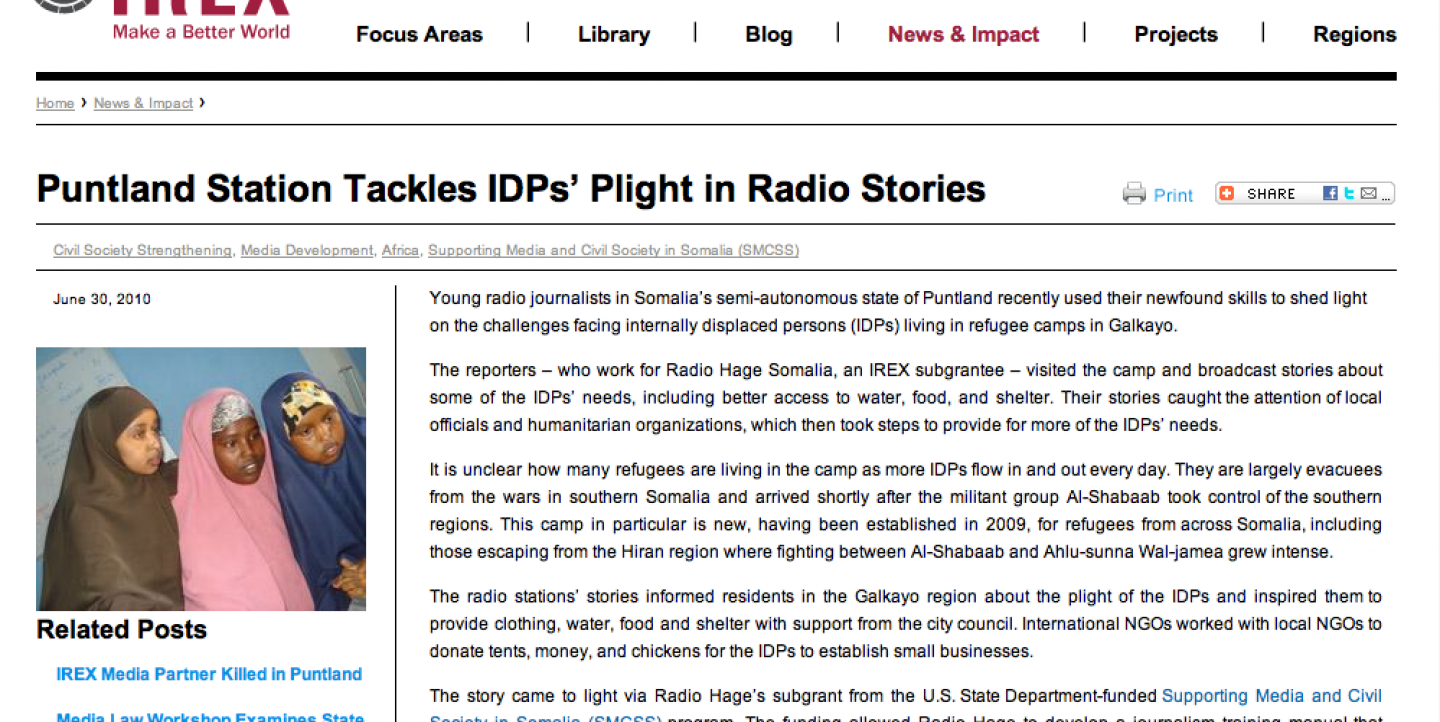As part of our series profiling World Press Freedom Day participants, IJNet spoke with Abdikadir Ahmed, IREX field projects officer for Somalia, based in Hargeisa, Somaliland.
(IREX) is an international nonprofit that enables individuals and institutions to build key elements of a vibrant society, such as quality education, independent media and strong communities.
Ahmed will take part in a panel at the World Press Freedom Day conference focusing on Accessing the Digital Benefit to find innovative ways of getting information to poor and rural communities. It will be held May 2 at the Newseum in Washington, D.C.
IJNet : Can you tell us briefly about the projects IREX is running in Somalia?
Ahmed: Right now we are running a conflict mitigation project called “Uniting Communities to Mitigate Conflict in Somalia.” We are working on enhancing media skills and products to be used in reducing conflict in the country. We are helping develop documentaries, blogs and traditional media.
IJNet : What challenges are you facing?
Ahmed: The main challenges we are facing are related to security issues in some parts of Somalia, especially in the southern and central part. IREX works all over Somalia. We have offices in Puntland and Somaliland (which recently became a self-declared independent territory), where it is relatively calm. I am based in Somaliland, in Hargeisa, where we have our largest office. We do not have an office in Mogadishu and that is due to the security issues over there. Instead, we have some partners.
IJNet : What forms of journalism already exist in the remote areas of Somalia?
Ahmed : Radio is indeed more popular because it is easily accessible and it can reach wide communities. [In] Hargeisa, [which] is a big city, we have more television stations. When it comes to rural areas, they prefer radios. Radio presenters are more famous. Newspapers are only available in the cities.
IJNet : How do you rate the current performance of Somali media and its role in rural and urban societies?
Ahmed : When it comes to local stations, media professionals need a lot of training. Sometimes, due to their lack of ethical knowledge and professional skills, they might endanger themselves. They might induce a reaction from a warlord or others. They might get killed or tortured.
Social Media Change
Ahmed : How much is social media used in Somalia? Now that social media played a role in North African uprisings, what kind of a change do you think it will produce in Somalia?
Ahmed : Nowadays, mainly in the cities, you will find Internet cafes. Youth are using Facebook and chatting. If someone posts something on Facebook, there are thousands of people who pass it on. We have plenty of news websites, about 700. But when it comes to blogs, it is something new. In Somalia, we have extremists and moderates. … Social blogs can help Somalis come out with peaceful ways for [dealing with] a conflict that’s been going on for more than 20 years.
IJNet : Why is it that important to discuss the gap in Internet access?
Ahmed : It is expensive to have an Internet connection at home. Many cannot afford even going to Internet cafes. The gap is there. The quality of the Internet connection is poor. But overall, Internet access is good compared to other East, South African countries. A person who does not have any access is missing out on all the opportunities the Internet is providing. … Some extremists might say we do not need laptops or good Internet access, but the majority of Somalis would prefer to see this technology spread. I think it is crucial to the development of the society.
IJNet : Does access to the Internet make users less fundamentalist?
Ahmed : It comes to how you use it . You might visit a website that can take you to more extremism, but I believe since it connects you to the world and what is going on, then it will lead users to become more tolerant.
Access & good journalism
IJNet : Should everyone have access to the Internet and to computers in order to have access to good journalism?
Ahmed : Yes, because everyone who wants to become a journalist should have access to the Internet. If I compare an American journalist to a Somali journalist, the gap is wide. One is professionally trained and the other not. If a Somali reporter gets the same access an American reporter is getting, I [as a citizen] would be better informed about what is going on in Somalia.
IJNet : Literacy is still an issue in Somalia. How can journalism help in this case? Do organizations like yours need to start with literacy projects before moving on to computer classes and then training journalists?
Ahmed : Literacy is still an issue, specifically for women. We have cultural barriers, so fathers would not allow their daughters to go school. Things are changing for the new generation, but women are still the most affected, in cities and rural areas. There are still also men who cannot read or write.
IJNet : What does World Press Freedom Day means to you?
Ahmed : It means to improve press freedom in the world. … For me it means helping people get the burden of repression out of their way.

